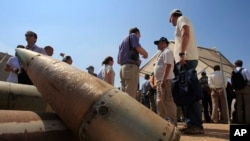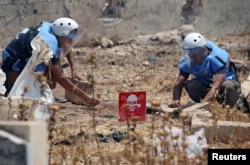The Pentagon has put off indefinitely a planned ban on using certain cluster bombs, which release explosive sub-munitions, or bomblets. The U.S. military considers them a legitimate and important weapon, although critics say they kill indiscriminately and pose hazards to civilians.
A 2010 international treaty outlaws the use of cluster bombs, but the U.S. is not a signatory.
The George W. Bush administration declared in 2008 that after Jan. 1, 2019, the United States would continue its use of cluster bombs only if they met a performance standard of failing to detonate 1 percent or less of the time. That standard is important because armed and unexploded cluster munitions left on the battlefield pose a long-term hazard to civilians.
Tom Crosson, a Pentagon spokesman, said that despite efforts to develop more reliable, and thus safer, cluster munitions, the U.S. military has been unable to produce bombs with failure rates of 1 percent or less. He said it's unclear how long it might take to achieve that standard, and thus the Pentagon concluded in a months-long policy review that it should set aside the 2019 deadline and allow commanders to authorize the use of the weapons when they deem it necessary.
The new policy drew immediate criticism. Mary Wareham, arms division director for Human Rights Watch, said there is no compelling reason for the use of cluster munitions.
"The U.S. says it can't produce 'safe' cluster munitions, so it has decided to keep using 'unsafe' ones," she said. "We condemn this decision to reverse the long-held U.S. commitment not to use cluster munitions that fail more than 1 percent of the time, resulting in deadly unexploded sub-munitions." Her organization is chair of the Cluster Munition Coalition, an international campaign seeking to eliminate cluster bombs.
A new Pentagon policy approved Thursday erases the 2019 deadline and asserts that the weapons are legitimate, not necessarily a humanitarian hazard, and important for wartime attacks on "area targets" like enemy troop formations.
The new policy authorizes commanders to approve use of existing cluster bombs "until sufficient quantities" of safer versions are developed and fielded. "Safer" means meeting the 1 percent failure standard or developing bombs equipped with a self-destruct mechanism or that can be rendered inoperable in 15 minutes or less by the exhaustion of their power source.
The policy does not define what qualifies as "sufficient quantities" of safer weapons, and it sets no new deadline.
U.S. arguments
In practice, the U.S. rarely uses cluster bombs. The Pentagon says its last large-scale use was in the 2003 Iraq invasion. They could be considered important for use in a large-scale conflict such as a ground war against North Korea.
In a memorandum signed Thursday, Deputy Defense Secretary Patrick Shanahan said the U.S. remains committed to fielding weapons that are effective in war and that "minimize unintended harm" to civilians and U.S. and partner forces.
"Although the [Defense] Department seeks to field a new generation of more highly reliable munitions, we cannot risk mission failure or accept the potential of increased military and civilian casualties by forfeiting the best available capabilities," Shanahan wrote.
"Cluster munitions are legitimate weapons with clear military utility," Shanahan wrote. He also asserted that cluster munitions "may result" in less unintended harm to civilians and others than if other types of weapons have to be used instead against certain targets like massed formations of enemy troops and time-sensitive or moving targets.
By law, the U.S. cannot provide cluster munitions to other countries unless they meet the 1 percent failure standard.





